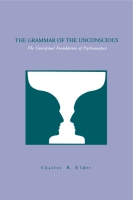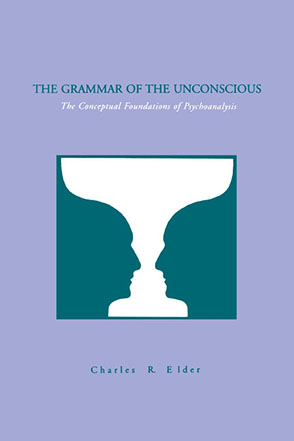The Grammar of the Unconscious
The Conceptual Foundations of Psychoanalysis
Charles Elder
“This book makes an important contribution to understanding the nature and status of psychoanalytic theory by showing how a Wittgenstein-inspired clarification of Freud’s original work dissolves commonplace misunderstandings about the unconscious mind. Its detailed analysis of various aspects of the metapsychology represents an important contribution to deconstruction of empiricist claims on behalf of psychoanalysis. Elder’s apt adaptation of Wittgenstein’s grammatical method to psychoanalysis addresses questions at the core of the debate between hermeneuticists like Ricoeur and Habermas on the one hand and philosophers of science like Grunbaum and Edelson on the other. Elder argues convincingly that the value of psychoanalytic theory lies primarily in its innovative conceptual framework, set of terms, images, and models for the description of human experience. Whether or not one accepts Elder’s conclusions, one must be grateful for his careful and thorough treatment of the subject.”
- Description
- Reviews
- Bio
- Subjects
The Grammar of the Unconscious is both an inquiry into certain long-standing conceptual problems and the exemplification of Wittgenstein's grammatical method. The problems are for the most part those that surround the question of the status of psychoanalysis as a theory of symbolism, psychosexual development, and culture. Using the method of grammatical analysis, Elder clarifies the distinctive features and conditions of the language of psychoanalysis—conceptual, logical, and grammatical—thus showing both the validity and the limits of its truth.
“This book makes an important contribution to understanding the nature and status of psychoanalytic theory by showing how a Wittgenstein-inspired clarification of Freud’s original work dissolves commonplace misunderstandings about the unconscious mind. Its detailed analysis of various aspects of the metapsychology represents an important contribution to deconstruction of empiricist claims on behalf of psychoanalysis. Elder’s apt adaptation of Wittgenstein’s grammatical method to psychoanalysis addresses questions at the core of the debate between hermeneuticists like Ricoeur and Habermas on the one hand and philosophers of science like Grunbaum and Edelson on the other. Elder argues convincingly that the value of psychoanalytic theory lies primarily in its innovative conceptual framework, set of terms, images, and models for the description of human experience. Whether or not one accepts Elder’s conclusions, one must be grateful for his careful and thorough treatment of the subject.”
“The Grammar of the Unconscious reads and queries Freud’s understanding of psychical reality using Wittgensteinian ‘grammatical analysis.’ I am convinced that this use provides original and important critiques of Freud’s scientific self-understanding and of influential misreadings of Freud. As it does so, it exemplifies grammatical analysis in lively, moving, and clear language. The reader is invited to think with the author, who becomes a conceptually rigorous, meditative, lyrical, amusing, and honest guide, through the different uses of foundational psychoanalytical terms. In my judgment, this study should define the terms in which the status of Freudian theory is henceforth discussed.”
Charles R. Elder is a William Rainey Harper Fellow and teaches in the social science collegiate division of the University of Chicago.
Mailing List
Subscribe to our mailing list and be notified about new titles, journals and catalogs.




